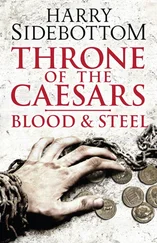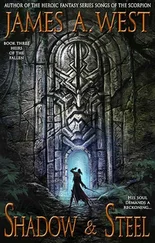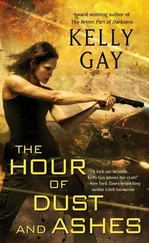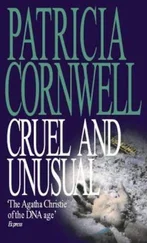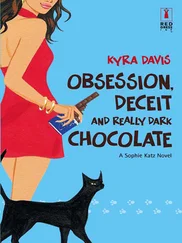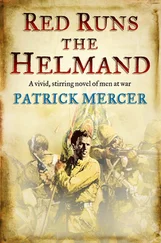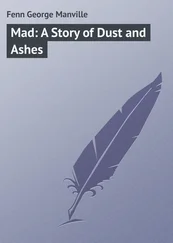‘Com…paneee, halt!’ McGucken brought the men to a stamping stop that sent two great brown and black scavengers squawking out of the nearby peepul trees. ‘It’ll take a while to get this lot clear, sir.’ There was no sign that the camel drivers, despite liberal application of their sticks, were clearing the snorting creatures from the gateway. ‘Think this is deliberate, sir?’
‘What, to stop us getting into the fort, Colour-Sar’nt?’ The idea hadn’t occurred to Morgan, who had been too busy watching the strange swaying animals to think of any subterfuge.
Now he looked up above the gate to the crenellated sentry points where two sepoys gazed down at the new arrivals. Both had their rifles pointing over the walls over the heads of the British.
McGucken had noticed them as well. ‘Don’t like the look of that pair either, sir. Shall we load?’
But before Morgan could make a decision, pushing low beneath the bellies of the camels came a young Englishman in scarlet shell jacket and the white trousers, which instantly marked him out as an officer of one of the Bombay regiments. His shoulders brushed the camels’ underbellies, and as he straightened up he subjected the drivers to a stream of what sounded to the 95th, at least, as remarkably fluent Hindi. His comments were met with redoubled efforts with stick and slaps, followed by renewed complaints from the animals.
‘Where’s your company commander, you?’ the officer asked the nearest soldier. Unfortunately for him, it was Corporal Pegg, who studiously ignored him, preferring to stand at the regulation position of ‘at ease’, weapon tucked comfortably at his shoulder, left foot forward, hands clasped over his belly.
‘You, are you deaf? Where’s your company commander?’ the Bombay officer repeated in a impatient growl.
‘Oh, sorry, sir.’ Pegg suddenly came to life, his left thumb casually stroking the pair of Crimea medals on his chest. ‘Thought you must have been talking to some native. My name’s not “you”. I’m Corporal Pegg of Her Majesty’s Ninety-Fifth. Captain Morgan’s yonder, sir, with Colonel Hume…’ Pegg pointed over his shoulder to where both officers stood, before adding, very quietly, ‘…you cunt.’
With a sidelong glance the young officer passed down the ranks, before seeing Morgan and Hume and stamping to attention, his hand flying to the peak of his white-covered cap.
‘Sir, I’m Lieutenant Forbes McGowan, adjutant, Tenth Bombay Native Infantry. My commanding officer, Commandant Brewill, has asked me to bring you into the fort, but to keep the men outside.’
‘If that’s what your colonel wants, McGowan, of course I will.’ Hume immediately took charge, ‘But would it not be better to get my boys within the fort?’
‘The commandant doesn’t want anything too unusual at the moment, sir. Things are pretty tense, what with the arrests last night; the slightest little thing might set the sepoys off.’ As if to illustrate the young officer’s fears, a ripple of sharp cracks sounded from within the fort. The sentries on the walls whirled round, eyes wide with alarm, rifles brought to the aim in an instant. The British troops, too, started and tensed at the noise.
‘It’s all right, sir. It’s just the bloody workmen that are stripping planks off the old barrack roofs and chucking them to the ground. But you see what I mean…everyone’s as tight as whips at the moment. Can you just get your men to wait here, sir, brew tea or anything that looks normal? Please don’t do anything that might unsettle our people further; just act as if everything’s harmony and bloody light, please, sir.’
Leaving the men under McGucken’s charge, Hume and Morgan followed McGowan back under the bellies of the still wedged camels, just as one let go a great stream of steaming, yellow liquid, much to the delight of the waiting men,
‘Better to be pissed off than pissed on, ain’t it, sir?’ yelled Corporal Pegg as the officers crouched and scrambled into the fort’s interior.
Inside the high stone walls, the sun beat down on a deserted parade ground of packed, dusty soil. At the far side, some two hundred paces away, were two flagpoles, one naked whilst at the head of the other, motionless, hung the colours of the Honourable East India Company. Just beyond, were the main buildings of the fort, white-washed offices on two storeys set behind porched verandas. Two sentries mechanically paced their beats, slowly marching towards each other before facing about, perfectly in time, and strutting back to their grey-painted, wooden watch-boxes.
As the three officers approached, the sepoys halted and faced their fronts before bringing their rifles to a smart present.
‘They look trim enough, McGowan,’ Colonel Hume said quietly as he, as senior officer, returned their salute. ‘Why d’you think they might be wobbly?’
Certainly, there was nothing in the men’s bearing that suggested unrest. Both were clean and smart in white trousers and cross-belts over old-fashioned scarlet, swallow-tailed coatees. Their peakless shakos and sandals looked odd to the Western military eye, but the new Enfield rifles were well oiled, their fixed bayonets glittered in the sun, and both men – smaller than their typical British counterparts – looked alert and intelligent.
‘Aye, sir, they probably are…’ McGowan broke off, telling the sentries to order arms, ‘…the problem seems to be just amongst a few hotheads, but I’ll let Commandant Brewill tell you everything before the court martial starts.’
‘No, it’s not been like that here in Bombay.’ Colonel Brewill, commanding officer of the 10th, had been defensive with Hume and Morgan from the moment they had been ushered into his office.
On the upper floor of the fort, the room was spacious enough, though darkened by the slatted blinds at the windows, shut against the midday sun. Above their heads a four-by three-foot rush screen, or punkah, swung on hinges, flapping gently backwards and forwards on a string pulled by a boy who crouched on the veranda outside.
‘Our men are very different from those up in Bengal. I’ve always said that you mustn’t keep all your high-caste men together in one company or battalion. The Bengal officers have always had a wholly misplaced conceit – in my eyes at least – in the fact that all their people come from the higher castes and classes. That’s all very well, but some of those buggers are touchy as hell. Why, I’m told that some of the Brahmins regard their food as being defiled if one of us walks past and lets his shadow fall upon it whilst it’s being prepared. No, we recruit from across all castes, and whilst our fellows might not be as big and well set up as those northerners, they’re the better soldiers for it,’ Brewill continued.
‘Ain’t you got any high-caste men in your regiment, then, Brewill?’ Hume asked, genuinely trying to grasp the size of the problem.
‘Yes, but not as many as the Bengal regiments tend to have, and there’s always been a tradition of slackness and mollycoddling of the jawans up there that would never be tolerated in this Presidency,’ Brewill replied sniffily.
Despite a lack of solid news during the voyage, Hume had done his best to explain to the officers the situation that they were likely to face when dealing with the mutiny. They were fully aware that there were three Presidencies, through which ‘John’ Company ruled and administered British India. So far, the outbreak of trouble had been confined to only one of them – Bengal.
‘At the same time that the first mutinies started last month, we issued the latest Enfields and I expected drama when the troops had to draw new cartridges. The rumour in Bengal was that they were greased with pork or beef fat – both degrading to Musselmen and Hindus when the paper cartridge is torn open with the teeth – in a deliberate attempt to break the men’s caste before forcing them to adopt Christianity. That shave spread like wildfire with mysterious bloody chapattis being hawked around the place as some sort of mystical sign that British rule would come to an end one hundred years after it started.
Читать дальше

